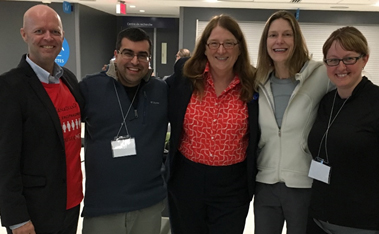Working with patients and their families to improve health outcomes for people living with ME/CFS
Sabrina had advocated for many causes over her career as a community builder, but never expected that she would need to use these skills as a patient.
That is until an invisible and insidious condition set in - one that has been progressively robbing Sabrina's body of its ability to regenerate energy for the past six years.


Sabrina is one of more than a half million Canadians who has Myalgic Encephalomyelitis (ME), also known as Chronic Fatigue Syndrome (CFS) or ME/CFS. A 2017 Statistics Canada survey revealed that more than 560,000 Canadians report that they have the disease; a staggering 37% increase over results gathered three years earlier.
Searching for a Diagnosis
In Sabrina's case, her journey began over six years ago, following a year of viruses, infections and walk-in clinics. While she expected to feel unwell and exhausted as her body was healing, she thought these symptoms would go away. Years later, however, she was still dealing with chronic flu-like symptoms, migraines, dizziness and fainting spells, crushing exhaustion and widespread pain. Initially, she focused on sleeping better, eating better, increasing her exercise and managing her stress as a way to fix whatever was going on. The symptoms persisted, however, and progressively got worse.
After many visits to her family doctor and several specialists, she was referred to a clinic in Nova Scotia that specializes in complex chronic cases for an assessment. There, she was seen by a nurse-practitioner who diagnosed her with ME/CFS. This diagnosis left Sabrina feeling scared, but also hopeful because she finally had an answer. She could target her efforts now and read up on her condition and how it was being treated.
As Sabrina began researching ME/CFS and connecting with other patients, she found that most struggle for years to get diagnosed and even when they do, there seemed to be no real treatment options offered in Canada. Many healthcare practitioners also struggled to understand the diagnosis often dismissing it with comments like, 'You don't look sick' or suggesting that patients should somehow push through and ignore their symptoms.
Many patients with invisible illnesses, including ME/CFS, will tell you that they have dealt with healthcare practitioners suggesting their symptoms are all, 'in their head' or psychological. Suggestions of deep breathing, mindfulness and pacing are frequently the only options being offered in the way of treatment. Sabrina struggled to understand why this was still happening when there was so much science that proved otherwise. There was no doubt that having this disease left patients often feeling misunderstood, alone and hopeless and that normal feelings of grief and loss impacted many patients' mental health. But it was clear to patients and their knowledgeable champions within the medical system, that these symptoms were secondary to the very real biological changes that were happening in the body.
Sabrina remained undeterred, notwithstanding the debilitating effects of her condition and while she waited to see other specialists, she continued to read every scientific paper, article and blog post on ME/CFS she could find. She also watched Unrest, a documentary by Jennifer Brea, detailing her journey with ME/CFS.
Eventually, frustrated with the lack of treatment options available in Canada, Sabrina travelled with her family to San Francisco early in 2018, to visit the Centre for Complex Chronic Diseases in Mountain View. She met with one of their specialists for several hours, went through her medical history in detail and was examined carefully. Within minutes of starting the appointment, it was clear that this physician was incredibly knowledgeable about ME/CFS and its co-existing conditions. She talked everything through with Sabrina and her husband and sent them back to Canada feeling more knowledgeable and supported than they had felt in a long time.
"She was sincere and compassionate, but more importantly, she was thorough and offered us testing and treatment options. We walked out of her office with more clarity and a plan for next steps."
Ending the ME/CFS Crisis
Sabrina believes that the key to ending the ME/CFS crisis in Canada and abroad includes more robust research, policy changes at the government level, and better medical education.
She stresses the important role that CIHR can play in providing equitable funding for research and ensuring effective knowledge dissemination to clinicians and other healthcare practitioners.
"We have always had evidence that this condition was biological, but we have ignored it because the psychological narrative has overtaken it. I think that the Canadian Institutes of Health Research (CIHR) is best placed to champion ME/CFS research and help patients finally get the recognition and support they need.
Dr. Karim Khan, Scientific Director of CIHR's Institute of Musculoskeletal Health and Arthritis really gets it. He has seen patients with the condition in his clinical practice, and he is up to date on current research. We are optimistic that real change is on the horizon, with his leadership. His motto is 'Stronger Together' and we couldn't agree more."
Although her life has been altered significantly, Sabrina remains upbeat and hopeful thanks to the scientists and researchers in this field who are working hard to understand the biological changes they are seeing in the bodies of patients.
"This disease is no longer in the shadows. Cutting edge research has begun to pave the way for better understanding, the development of possible new treatment options, and one day soon a diagnostic test that will simplify the process for both patients and physicians".
Sabrina is hopeful that new researchers will take an interest in ME/CFS and be a part of cracking the code on a disease that has been largely ignored for decades. "If you like tackling complex problems, working with some of the best scientists in the world and collaborating with a very passionate and informed group of patients, this is your opportunity to make a difference in the lives of so many Canadians."
What is ME/CFS?
ME/CFS is a chronic, multi-system disease associated with neurological, neurocognitive, immunological, autonomic, and aerobic energy metabolism impairment. The hallmark symptom of the disease, is post-exertional malaise (PEM), a delayed exacerbation of symptoms and a loss of stamina following even trivial cognitive or physical exertion.
The onset of ME/CFS is often sudden, typically following a viral or other type of infection, but may occur following other types of physical trauma. Patients describe feeling 'flu-like' symptoms chronically. In addition to the characteristic post-exertional malaise (PEM), patients may also experience cognitive impairment, unrefreshing sleep, autonomic manifestations, such as heart rate variability and orthostatic intolerance, muscle and joint pain, and sound, light, and chemical sensitivity.
ME/CFS can present with a wide range of severity. Even in the same patient, the level of severity can change over time and from day to day as symptoms wax and wane. People with ME/CFS are unable to go about their daily activities in a predictable or consistent manner. Up to 70% of patients are unable to work and 25% remain bed- or housebound.
(Source: Family Doctor [ PDF (3.81 MB) - external link ], Winter 2018)
- Date modified: